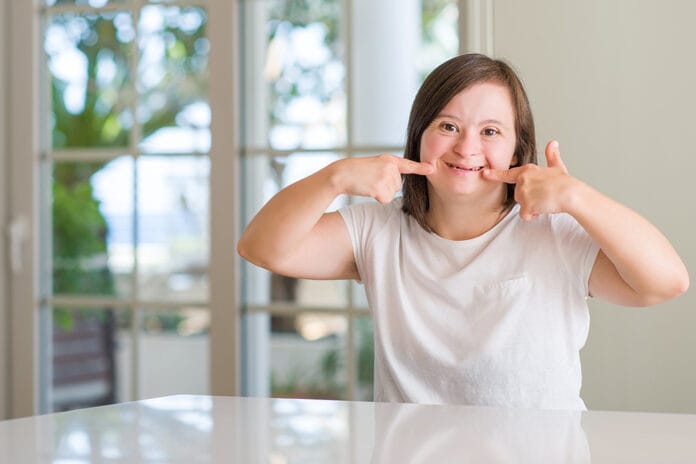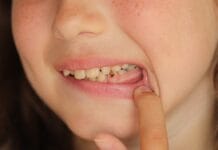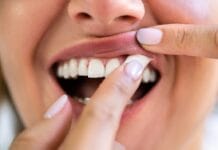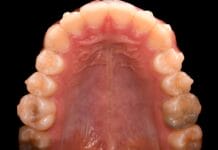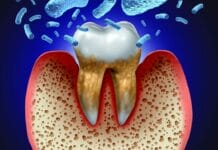Decades of research show that children with Down syndrome have a higher prevalence of oral and dental conditions than children without intellectual and developmental disabilities. These kids also have a higher chance of developing medical problems associated with or that can lead to oral health consequences. As a result, health care providers recommend that they seek ongoing support from dental health care professionals.1
Children with Down syndrome also struggle with visual and hearing impairments, which can negatively impact communication in dental care. In addition, stereotypes, lack of knowledge, and attitudes among health care workers can greatly impact the implementation of dental care for these children. “Children with Down syndrome deserve the same quality of health care as other children, and the same is true for dental health care.”1
In Sweden, for instance, there are medical guidelines in place for children with Down syndrome to establish contact with dental health care by the age of one at the latest. However, where a child resides can greatly affect their access to dental health care, especially if there are no well-established dental health care specialists in the area.1
Although many parents advocate for a holistic approach from health care workers, few studies have focused on parental perceptions of oral health care for children with Down syndrome in Sweden. The majority of studies available are from countries with different healthcare systems.1
In an effort to fill this gap, five researchers conducted a study, Dental Health Care for Children with Down Syndrome: Parents’ Description of their Children’s Needs in Dental Health Care Settings, published in the European Journal of Oral Sciences.1 Though this study was focused on Sweden, it gives good insight into parents’ perceptions that could be taken into account even in the United States.
Study Methodology
The study is based on the qualitative findings from research on parents’ perceptions of general, oral and dental health care for kids with Down syndrome in Sweden.
The Swedish Downs Syndrome Society’s social media and website invited parents to participate in the study in 2018. The society had a total of 480 members.1
The participants were given a 50-item survey of questions about parental perceptions of general, dental, and oral health care received by their kids between 0 and 18 years old. In addition to the health care received, the respondents were also allowed to make free comments related to the skills and knowledge of dental health care professionals and the meeting between children with Down syndrome and dental professionals.1
Study Results
Over 100 parents participated in the study, 91 mothers and 10 fathers aged from 28 to 58 years. Their kids ranged from 1 to 19 years old, and about 70% of the parents had a college or university degree.1
The study unraveled the following needs/gaps in dental care for children with Down syndrome.
Lack of Dental Care Continuity
Many parents admitted that continuity of care in dental healthcare offered to children with Down syndrome was lacking. A majority said that even if their kids don’t normally have challenges meeting new people, they often need extra time to familiarize themselves with new dental healthcare providers. Parents mentioned that dental care visits would improve if there were continuity from one dental appointment to the next.1
Dental Care Professionals’ Knowledge and Expertise
Parents stated that a significant number of dental care workers seemed to lack knowledge, experience, and skills in offering dental care to children with Down syndrome and children with intellectual disabilities in general.1
Additional appointments are sometimes necessary; however, if a dental professional has already treated the child, they seem to have a preconceived notion that the appointment will be difficult. As a result, their child did not always receive the care they expected or needed. Some even had to seek dental care from a different provider leading to prolonged waiting times for subsequent appointments.1
Caring Approach
Parents reiterated the importance of dental professionals meeting children with Down syndrome in an open and sensitive manner. Parents mentioned that the care professionals should strive to remain calm, humble, patient, and without prestige to avoid making the meeting difficult.1
Some parents also said it is wise for dental health care providers to talk to such children directly and clearly state what the child should do and what they should expect (show, tell, do). Rather than forcing the child to do things, parents agreed that taking the time to explain to the child would make it easier for children to participate and tolerate treatment.1
Other needs for children with Down syndrome discovered in the research included that it would be helpful for their children to have “practice visits.” Parents suggested it would be beneficial to be allowed to visit the dental clinic before their child’s appointment. “They wanted to come alone to discuss possible strategies with the dental health care professionals, as well as to speak about the time of day that possibly worked best for the child. It was a way of preparing both themselves and the dental health care professionals and gave the parent an opportunity to prepare the child before the visit.”1
Equal Rights and Treatment
Parents reported that they had come across dental health care professionals who had difficulty viewing their child as a unique individual, as if they assumed that all children with Down syndrome are the same. Some parents even reported that some dentists “did not seriously consider the fact that tooth agenesis is more common in children with Down syndrome, and this needs to be taken into consideration.”1 Further, “some also experienced situations that gave them the view that the dentist did not think that aesthetics–having nice-looking teeth–is as important for children with Down syndrome as it is for typically developed children.”1
Conclusion
The researchers state, “Our findings suggest that it is important for dental health care professionals to meet the child with Down syndrome in an open and a sensitive way. Dental examination and dental treatment can be a challenge both for the child as the professionals, and professionals’ adaptation to the child’s level of understanding is important. The success of this adaption highly depends on the dental health care professional’s ability to meet and involve the child. Parents of children with Down syndrome valued dental health care professionals who were patient and had an ability to engage the child, as well as those who were sympathetic, good communicators, and well-informed about Down syndrome. Parents are more satisfied when they can effectively collaborate with the professionals, which, they argued, improved their child’s quality of life. The attitude of professionals can affect how care is provided, and a stereotyped image of children with Down syndrome may negatively influence the care they receive. A negative experience can increase the risk of frustration in the child and the parents and may lead to uncooperating behavior in the child.”1
All patients should be treated as individuals who matter and have worth, whether they have a developmental or physical disability, systemic disease, or have no mental, physical, or systemic health concerns at all. This research shows there remain gaps in the treatment of certain populations, specifically, children with intellectual and developmental disabilities such as Down syndrome.
Before you leave, check out the Today’s RDH self-study CE courses. All courses are peer-reviewed and non-sponsored to focus solely on high-quality education. Click here now.
Listen to the Today’s RDH Dental Hygiene Podcast Below:
Reference
- Stensson, M., Norderyd, J., Van Riper, M., Marks, L., Bjork, M. Dental Health Care for Children with Down Syndrome: Parents’ Description of their Children’s Needs in Dental Health Care Settings. European Journal of Oral Sciences. 2022; 130(3): e12859. https://onlinelibrary.wiley.com/doi/full/10.1111/eos.12859

